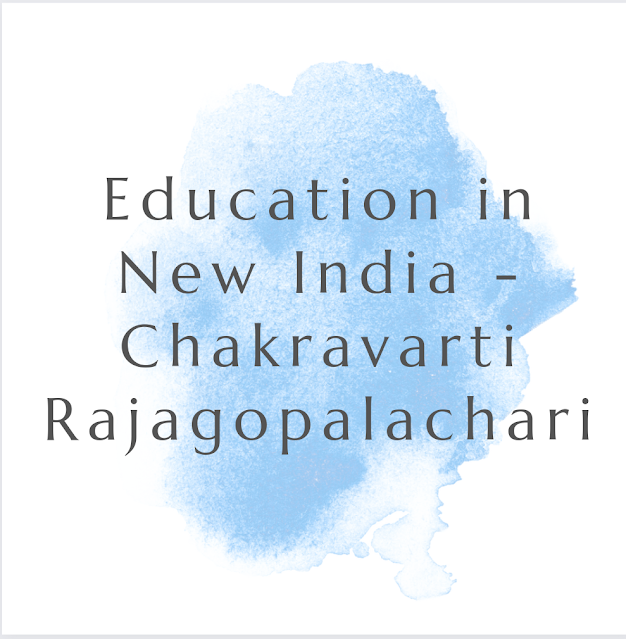Education in New India - Chakravarti Rajagopalachari
Also read :-
- No Man is an Island - Minoo Masani
- The Eternal silence of These Infinite Crowds - N.C.Chaudhari
- Science, Humanities and Religion - Sarvapalli Radhakrishnan
- The Secret of Work - Swami Vivekanand
The Author and the Essay at a glance:-
Chakravarti Rajagopalachari (1879-1972) was a brilliant lawyer, statesman and a forceful speaker and writer. He gave up his fabulous practice as a lawyer to join the Congress and the national movement for freedom, but formed his own political party, the Swatantra party because of political differences with the Congress leaders. He was the first Indian to become the Governor-General of India.
As a writer his writings are characterised by a conventional ease which immediately develops a rapport with the reader.
The present article is an extract from the Convocation Address delivered at Madras University in 1948. The suggestions made by him in the address are relevant even today.
Points to remember:-
1. While freedom has given us a new status, it has imposed on us some new responsibilities.
2. Work and unceasing honest work should be our watch-word. 3. We must learn to respect other people's feelings. Unity in diversity should be our aim.
4. Universities, directly or indirectly train people in leadership. It is the duty of university graduates to guide less educated people.
5. There should be less stress on examinations and more on opportunities for study and assimilation of what they have read
6. It is the love of knowledge and aptitude, rather than ambitious prospects of careers and employment, that small guide students in their choice of studies.
7. The problem of imparting religious and moral education in schools and colleges is a ticklish one. There are people of diverse religions beliefs and faiths. Still a suitable curriculum should be evolved to serve the spiritual need
8. A foreign language should not be imposed as a medium of instructions particularly in case of small children. 9. Our aim of education should be not only to teach reading, writing and Arithmetic (the three R's) but to make children morally and culturally developed.
Summary:-
Freedom has given us a new status but at the same time new responsibilities. We have to discipline ourselves in our behaviour so that we may discharge our duties in our different spheres and capacities for the progress of the nation. Ceaseless honest work should be our watch-word idleness being the greatest crime.
Besides hard and honest work we must learn to respect other people's feelings. There are in our country, people of different religious faiths and beliefs and occupations, and we have to live with them amicably If is the unity in diversity that should be our watch word. Unfortunately it is our selfishness and personal ambitions that has been misunderstood as communal ill will. We are not communal otherwise.
To manage the affairs of an independent state trained leadership is very Since universities do impart this training indirectly, it behaves university-graduates to lead less educated people in the daily conduct of their duty. While physical defence is the responsibility of the defence forces, moral and cultural responsibility is of the educated and enlightened leaders.
There should be less stress on examinations, and more on opportunities for studies and associations of what they have read. Formalities of examinations leave a very pernicious effect on the candidates. In reputed foreign universities it is the lone of work and better facilities for study and research that are conducive to higher standards of attainment, and not any strict system of examinations. Virtually it is the love and aptitude rather than irrelevant ambitions of career and employment that should guide students in their choice of studies.
There are two problems that worry the educationists in India. The one is the problem of religious and moral education in a country where there are many faiths and religions. The problem is as to what should be the type of moral and religious education that should be acceptable to all. No doubt, there are different ways. of life, forms of worship associated with different denominations of religions, yet a suitable curriculum can be evolved to serve the spiritual need of the school children. Our purpose should be to train the children to love one another, to be kindly and helpful to all, to be tender to lower animals and to think aright.
The other problem arise out of a large variety of languages. But it is no good trying to impose a medium of instruction which is not their mother tongue. In the past parents liked their children to be taught through English medium in each and every subject, but they are now realising their mistake that much of the spirit of a subject is lost by teaching it through a foreign tongue. Hence the need of teaching, particularly, small children through their own mother tongue.
Lastly, the author talks of culture and moral development. What are those qualities of mind that make a man cultured? Culture implies many virtues. To begin with, a person must have restraint in his behaviour so as not to hurt the feelings of others. One must be patient and kindly under all circumstances. Rudeness in talk, jealously and desire to boast should he eliminated. He must have consideration for others' point of view and not stick to our own. Belief in God Almightily and universal love are the summum bonum of life.
